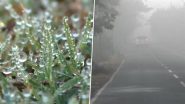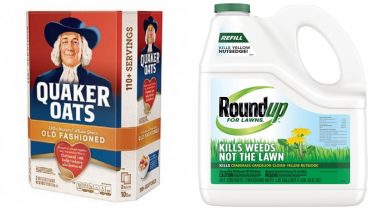A new study has revealed that Quaker oats’ and other breakfast cereals consumed by children in North American contain dangerous levels of glyphosate, a herbicide which has been described as a probable cause of cancer by the World Health Organisation.
The study, carried out by the non-profit Environmental Working Group, found that 43 out of 45 popular breakfast cereals tested in three locations in the U.S. contained traces of glyphosate. Products with some of the highest levels of glyphosate include granola, oats and snack bars made by leading industry names Quaker, Kellogg’s and General Mills, which makes Cheerios.
The highest levels were found in Quaker Old Fashioned Oats - 1,000 parts per billion (ppb) of glyphosate. The EWG calculated levels above 160 ppb as unsafe for children.
The World Health Organization’s cancer research agency classified glyphosate as “probably carcinogenic to humans” in 2015. In the U.S., the Environmental Protection Agency (EPA) labeled glyphosate a carcinogen in 1985, but reversed its position in 1991.
Glyphosate is the active ingredient in Roundup, a weed-killer manufactured by Monsanto. Last week a court in California ordered Monsanto to pay $39 million in compensation and $250 million in punitive damages to a school groundskeeper who developed non-Hodgkin’s lymphoma after years of using Roundup at work.
“It is very troubling that cereals children like to eat contain glyphosate,” said Alexis Temkin, an EWG toxicologist and author of the report. “Parents shouldn’t worry about whether feeding their children heathy oat foods will also expose them to a chemical linked to cancer. The government must take steps to protect our most vulnerable populations.”
U.S. farmers spray about 200m pounds of Roundup each year on their crops, including corn, soybeans, wheat and oats. It can also be used on produce such as spinach and almonds. The use of glyphosate on base crops means it gets transferred in the food chain and lands up on our table in the form of bread, popcorn, oat flakes, etc.
Glyphosate is also increasingly used in India, especially on HT (herbicide tolerant) cotton crop as it kills the weeds, while allowing the resistant plants to grow. Responding to a question in Parliament on the use of glyphosate for cotton, Minister of State for Agriculture, Gajendra Singh Shekhawat, recently said, “glyphosate is registered for use in the country on tea and non-crop area.”
However, according to a report in Hindu Business Line which cites Indo-Canadian food security activist and author of Poison Foods of North America Tony Mitra, use of glyphosate in Sri Lanka has been linked to kidney damage among sugarcane plantation workers. Tea estate workers have reported a rise in instances of oesophageal cancers ever since the government lifted a ban on the use of glyphosate.
The Union Ministry of Agriculture on 8 August put out a gazette notification banning 18 neonicotinoid pesticides in the country. While 12 of them are banned with immediate effect, six will be phased out by December 2020 but glyphosate is not among those that have been banned.
According to the Directorate Of Plant Protection, Quarantine and Storage, 148 of the 414 metric tonnes of weedicides consumed in the country in 2014-15 was glyphosate.
Activists from Greenpeace India questioned the decision to leave glyphosate out. Sehar Iqbal, the manager food for life campaign, Greenpeace India said, “The current ban leaves out monocrotophos and glyphosate, which still leaves farmers, farm workers and rural families (especially children) at risk and poisons the soil affecting farmer livelihoods, not to mention seriously compromising the health of consumers,” she said.
(The above story first appeared on LatestLY on Aug 17, 2018 08:44 AM IST. For more news and updates on politics, world, sports, entertainment and lifestyle, log on to our website latestly.com).













 Quickly
Quickly





















